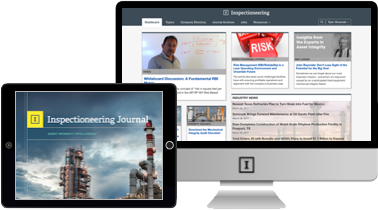In May of this year, a workshop was presented at the annual NPRA Reliability and Maintenance Conference at the George R. Brown CC in Houston. This article is a reader’s digest summary of what was presented at that workshop by the four panelists. The purpose of the workshop and hence this article is to let readers know what has been recently published and what’s underway for the next editions and/or new publications being created by the API and ASME with regard to In-Service Inspection (ISI) practices. The standards discussed included:
- API 510 Pressure Vessel Inspection Code, 9th edition (published)
- API 570 Piping Inspection Code 3rd edition (in preparation)
- API 571 Damage Mechanisms in the Petrochemical Industry 2nd edition (in preparation)
- API 574 Piping Inspection Practices 3rd edition (in preparation)
- API 578 Welding Metallurgy and Inspection 1st edition (published)
- API 578 Material Verification Programs for Piping Systems 2nd edition (in preparation)
- API 579 Fitness for Service Analysis 2nd edition (nearing publication)
- API 580 Risk-Based Inspection 2nd edition (in preparation)
- API/ASME ISI Code for Pressure Equipment (in preparation)
- ASME PCC-2 on Repair and Testing of Pressure Equipment 1st edition (published)
- ASME PCC-3 on Risk-Based Inspection Planning (in preparation)
The workshop started with Roland Goodman, Senior Standards Associate for ISI standards at the API, providing an overview of the ANSI consensus process that is used to create, publish and update all API standards. The highlights of Roland’s talk include:
- API standards become defacto international standards because they are formulated with international input and used worldwide by owner-users in the refining and petrochemical industry
- Many of the API ISI standards are referenced or adopted by regulatory bodies
- API ISI standards are written with some flexibility in mind and are typically not “cookbook” approaches, which means that owner-users may need to have supplemental procedures to adapt them to their own needs
- The ANSI consensus process ensures that API ISI standards are extensively reviewed, commented upon, and balloted by a large list of member and non-member companies/ individuals in an open and transparent process before being published.
Next, John O’Brien of Chevron Technology Co. and current Vice-Chair of the API Inspection Subcommittee summarized some of the changes soon to be published in the next editions of API 571, 577 and 578.
API 571, when it was first published in 2003 quickly became an excellent source for “one stop shopping” on damage mechanisms that afflict pressure equipment in the oil and chemical industry. As such it supports the API Inspector Certification Program (ICP) for Authorized Pressure Vessel, Piping and Storage Tank Inspectors, as well as having its own supplemental certification program that more advanced inspectors can achieve to show their knowledge of materials and corrosion issues. It also supports RBI and FFS, by supplying the necessary damage mechanism information for doing inspection planning as well as determining fitness for continued safe service after inspections reveal some amount of damage present. Besides updating the current text on damage mechanisms, the next edition which is due out in 2008 will include major improvements to the section in each damage mechanism covering “Inspection and Monitoring”. Additional NDE information is planned for:
- Application and limitations of the various NDE techniques
- Considerations for equipment access for each technique
- Options available for continuous monitoring
- Decision charts that will help users to determine what techniques are best suited to find and size each damage mechanism
API 577 was first published in 2004 and quickly became an excellent source of welding information for inspectors and engineers because it was formulated with the specific welding issues and needs of the refining and petrochemical industry in mind. It too supports the API ICP program for Authorized Inspectors, and in 2008 will also become the subject of another of the supplemental certification programs for more advanced inspectors. In the next edition, due out in 2009 there will be a significant increase in the section covering specific welding issues associated with refineries and petrochemical plants, as well as adding additional welding inspection advice, especially with regard to newer NDE technologies.
API 578 was first published in 1999 providing guidance to users on how to effectively verify that the specified materials of construction were being received and installed. Ballot resolution on the 2nd edition will be conducted at the API Standards Meeting this coming September and includes a number of important updates, including:

















Comments and Discussion
There are no comments yet.
Add a Comment
Please log in or register to participate in comments and discussions.